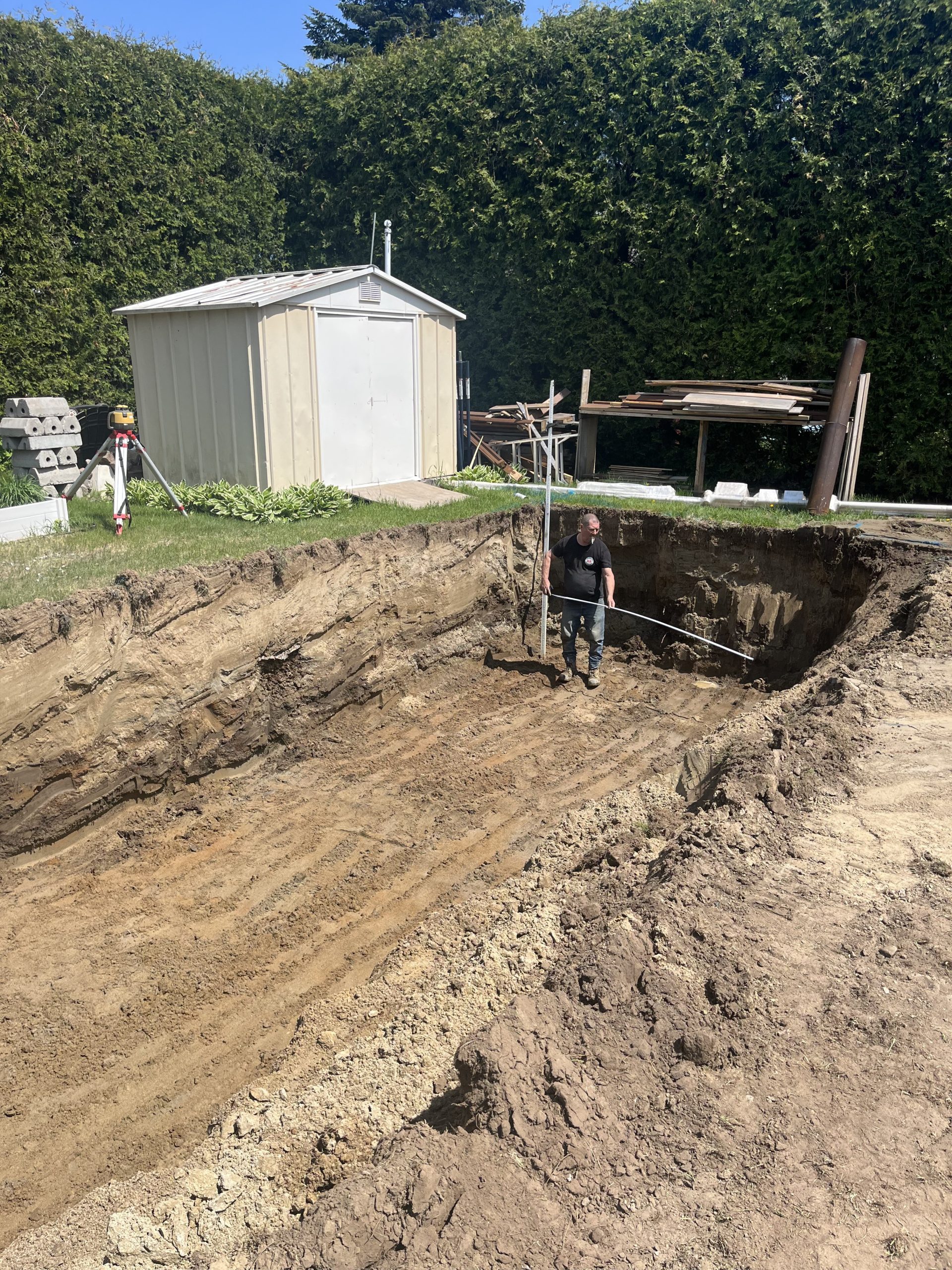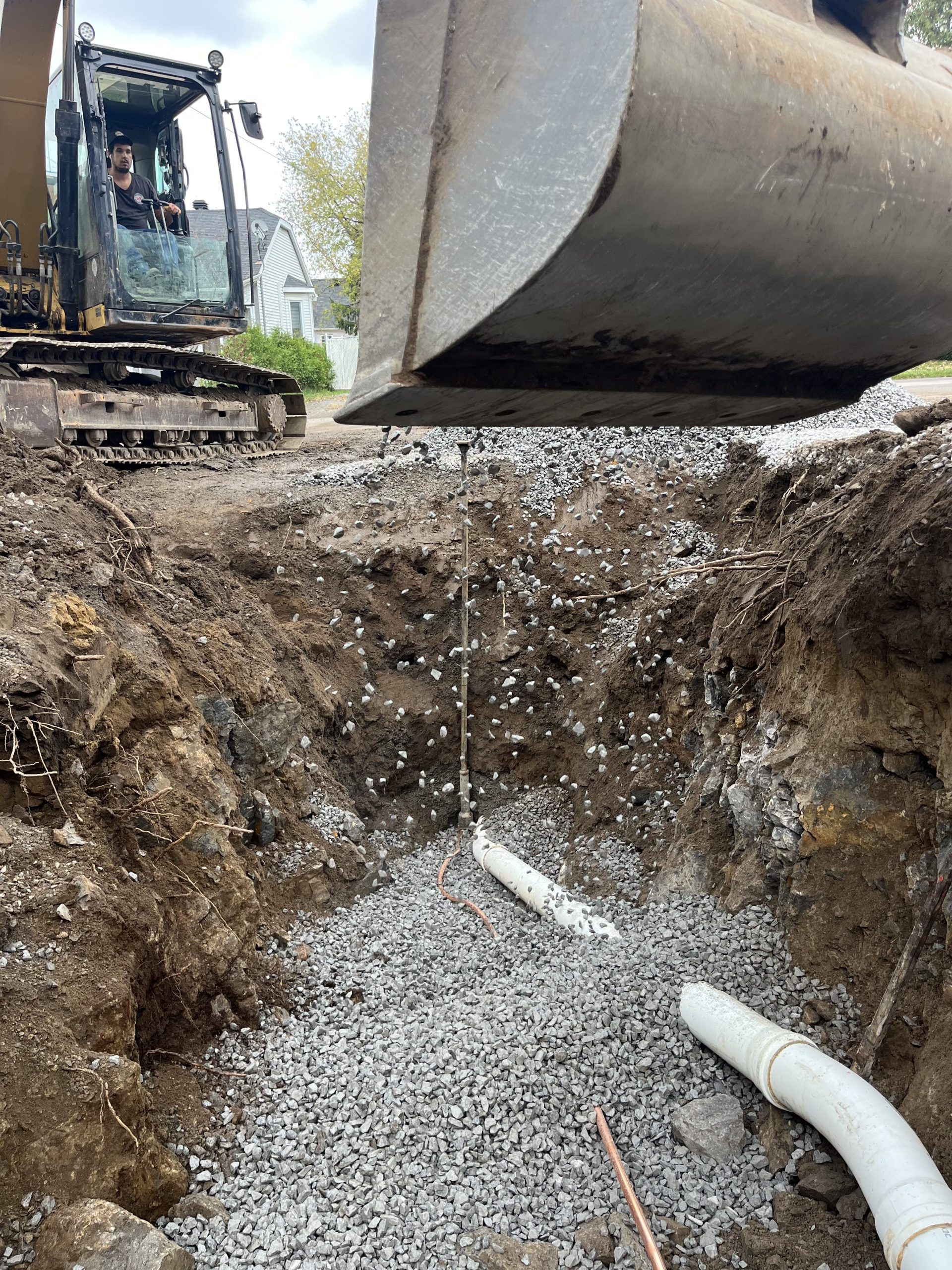Excavation (residential, commercial, civil engineering)

Excavation for foundation
Cellar excavation is a crucial step in maximizing your property’s space. At Excavation D.R., we carry out precise, well-planned cellar excavations, providing the ideal solution for expanding your underground living space. Rely on our expertise for impeccable results.
Foundation excavation is a crucial process in building construction, ensuring a solid, stable base for the structure.
Before starting, a detailed site survey is carried out to understand soil composition, topography and potential challenges. This often includes geotechnical studies to assess the nature of the soil and determine the appropriate foundation depth.
This stage involves removing any existing vegetation, debris or structures from the site. It’s essential for creating a clear, accessible workspace.
Using heavy machinery such as backhoes and bulldozers, the soil is excavated to the required depth. This depth is determined by the building’s load and the soil’s characteristics.
After excavation, the foundations are laid. This can include pouring concrete for footings, building retaining walls and installing piers or beams, depending on the type of foundation chosen.
To protect the foundation from water and moisture, drainage systems are installed. In addition, waterproofing measures can be applied to prevent water infiltration into the structure.
Throughout the process, regular inspections are carried out to ensure that construction and safety standards are met.

General excavation
Our general excavation service covers a wide range of earthworks and construction projects. It involves moving large quantities of earth, rock or other materials to create the foundations needed for construction projects. This service is crucial for the preparation of sites prior to the construction of buildings, roads or other infrastructures.
Before beginning excavation, a detailed site assessment is required. This includes surveying the soil, assessing potential risks, and planning the best excavation approach. This phase ensures that the project complies with environmental and safety standards.
In some cases, excavation services include the demolition of old structures or rocks on the project site. This stage often uses specialized equipment to break up and remove unwanted material.
During excavation, groundwater management is crucial to avoid flooding the site or damaging surrounding structures. Methods such as pumping or drainage are used to control water levels.
After excavation, it is often necessary to stabilize the ground to prevent landslides or subsidence. This can include soil compaction or the use of reinforcement techniques such as shotcrete or retaining walls.
Once excavation is complete, the site must be restored. This may involve replacing excavated soil, reforestation, or other measures to restore or improve the site’s environment.
Excavation services often require close coordination with other construction professionals, such as plumbers, electricians and masons, to ensure that the excavation precisely matches the needs of the project.
Effective excavation management is essential to ensure that the project stays on time and on budget. This requires careful planning and constant communication between all parties involved.

General excavation
Our general excavation service covers a wide range of earthworks and construction projects. It involves moving large quantities of earth, rock or other materials to create the foundations needed for construction projects. This service is crucial for the preparation of sites prior to the construction of buildings, roads or other infrastructures.
Before beginning excavation, a detailed site assessment is required. This includes surveying the soil, assessing potential risks, and planning the best excavation approach. This phase ensures that the project complies with environmental and safety standards.
In some cases, excavation services include the demolition of old structures or rocks on the project site. This stage often uses specialized equipment to break up and remove unwanted material.
During excavation, groundwater management is crucial to avoid flooding the site or damaging surrounding structures. Methods such as pumping or drainage are used to control water levels.
After excavation, it is often necessary to stabilize the ground to prevent landslides or subsidence. This can include soil compaction or the use of reinforcement techniques such as shotcrete or retaining walls.
Once excavation is complete, the site must be restored. This may involve replacing excavated soil, reforestation, or other measures to restore or improve the site’s environment.
Excavation services often require close coordination with other construction professionals, such as plumbers, electricians and masons, to ensure that the excavation precisely matches the needs of the project.
Effective excavation management is essential to ensure that the project stays on time and on budget. This requires careful planning and constant communication between all parties involved.
